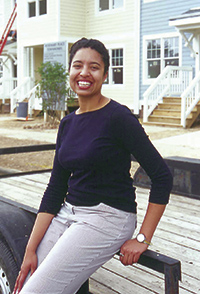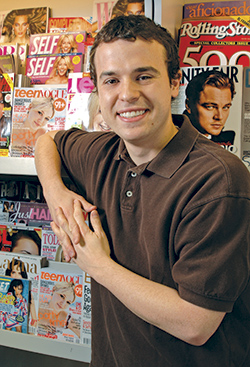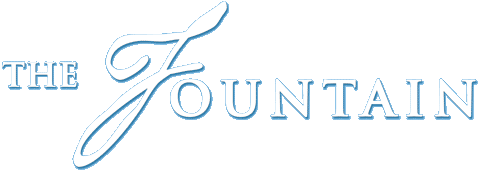A Debt of Gratitude
Royster Fellowships provide means to achieve

For Lisa Bates (above) and Stephen Vaisey (below-left) the offer of a Royster Fellowship was a decisive factor in their decision to attend Carolina.
When Carolina doctoral graduate Lisa K. Bates was deciding on a doctoral program in which to study City and Regional Planning, one word weighed heavily on her mind: debt. Bates was excited to be embarking on a new phase in her life, but worried about the financial burden of her decision and how her life might be affected once she completed the program.
“The Department of City and Regional Planning at the University of North Carolina at Chapel Hill is a top department in urban planning,” Bates says. “I hoped to join the Ph.D. program, but was definitely concerned about the financial aspect of a doctoral program.”
For Bates, like for many other students, the decision was made when she was offered a Royster Fellowship. It meant multiple years of funding, a livable stipend and a final year dedicated to her dissertation, free from the responsibilities of an assistantship position.
“No other university could provide the funding that Carolina could provide with the Royster Fellowship,” Bates says. “It made my decision to go to UNC-Chapel Hill. As a student, I was able to focus completely on my courses and research, rather than worrying about funding from semester to semester. Even better was the final year of funding, which did not require an assistantship. I was able to give full attention to my dissertation without teaching classes or working on other projects.”

Stephen Vaisey
Today, Bates is an Assistant Professor in the Department of Urban and Regional Planning at the University of Illinois at Urbana-Champaign, where she researches policy issues that influence revitalization strategies for declining neighborhoods and affordable housing for low-income families. She is often reminded of the opportunities afforded to her by the generosity of donors like Dr. Thomas S. and Mrs. Caroline H. Royster.
“I see colleagues who are a few years out of graduate school and are struggling with massive debt from loans,” Bates says. “I am so grateful that I do not have that huge debt hanging over my head right now — working towards tenure is stressful enough!”
In her new career, Bates sees the importance of graduate funding from a new perspective, one that puts her on the other side of the admissions process.
“I now coordinate graduate admissions for my department,” Bates says. “I know from recruiting applicants that excellent candidates get amazing offers from the best programs. It not only shows that the program values you as a candidate, but it also shows the university understands the value of graduate education and that its quality is recognized by donors.”
For Stephen Vaisey, who is completing his doctoral degree in Carolina’s Department of Sociology this spring, graduate school would not have been possible without a Royster Fellowship. What the fellowship offered Vaisey, who entered graduate school with a young family, was something even more valuable than funding: time.
“As a non-traditional student who was supporting a family, the offer of a Royster Fellowship was the decisive difference in my decision to attend Carolina,” Vaisey says. “It allowed me to really excel in my coursework without having to take time away from my family.”
| Name | Department | Term |
|---|---|---|
| John McGowan | English | 1997-2001 |
| Susan Lord | Pathology & Laboratory Medicine | 2001-2004 |
| Peter Robinson | Geography | 2004-2007 |
| Laurie Maffly-Kipp | Religious Studies | 2007-2010 |
| Name | Department | Term |
|---|---|---|
| Jonathan Hess | Germanic Studies | 2002-2006 |
| Tom Kawula | Microbiology & Immunology | 2006-2009 |
Vaisey has used his time at Carolina wisely. He has been the recipient of such prestigious awards as the National Science Foundation Graduate Research Fellowship, the Charlotte W. Newcombe Dissertation Fellowship and the Howard W. Odum Award for Excellence, given by the faculty to the most outstanding graduate student in the Department of Sociology. The past winter was spent fielding job offers from such prestigious educational institutions as the University of Chicago, the University of Michigan and the University of California, Berkley, just to name a few. It also meant juggling a hectic travel schedule with the daily responsibilities of school and family life.
“It has been crazy. I ended up doing 10 interviews and turning down some others,” Vaisey says. “I was gone about half the time from October to December of 2007. I felt like a traveling sociology road show!”
As his time at Carolina comes to a close, Vaisey is vocal about the importance of programs like the Royster Society of Fellows for non-traditional students such as himself.
“For prospective students who have families, the additional funding and flexibility provided by the Royster Fellowship is a huge factor,” Vaisey says. “If it was not for the generosity of donors like the Roysters, I would not be at Carolina. The support they provided and the program they established has had a huge impact on me and my family.” • J. Todd Brantley


